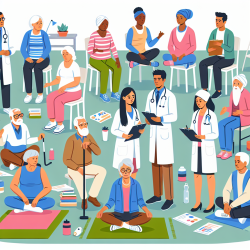The aging population presents unique challenges and opportunities for healthcare practitioners. As the number of older adults increases globally, understanding the disparities in health-related quality of life and functional health becomes crucial. A recent study titled "Inequalities in health-related quality of life and functional health of an aging population: A Canadian community perspective" provides valuable insights that practitioners can leverage to enhance their skills and improve patient outcomes.
The Importance of Addressing Health Inequalities
Health inequalities among older adults can significantly impact their quality of life and functional capabilities. The study highlights that approximately 90.3% of individuals reported less than perfect quality of life, with 18.8% experiencing less than perfect functional health. These disparities are more pronounced among females and adults aged 80 years and older, particularly in certain geographic regions like the Prairies and Western Ontario.
Key Findings and Implications for Practitioners
- Gender Disparities: Females reported a higher prevalence of poor mobility and pain compared to males. Practitioners should consider gender-specific interventions to address these issues effectively.
- Age-Related Challenges: Adults aged 80 years and older showed a higher prevalence of poor cognition and functional health. Tailored interventions focusing on cognitive training and physical activity can help mitigate these challenges.
- Geographic Variations: Regions like Quebec reported better quality of life compared to the Prairies. Understanding regional disparities can guide practitioners in developing location-specific strategies to improve health outcomes.
Actionable Steps for Practitioners
Practitioners can take several steps to address these inequalities:
- Implement Gender-Sensitive Approaches: Develop programs that specifically target the unique needs of female patients, focusing on mobility enhancement and pain management.
- Focus on Cognitive Health: Incorporate cognitive training exercises into routine care for older adults, particularly those over 80, to maintain mental acuity.
- Leverage Community Resources: Collaborate with local organizations to provide social support and resources tailored to the needs of specific regions.
- Promote Healthy Lifestyle Choices: Encourage physical activity, balanced nutrition, and regular health check-ups as part of a comprehensive care plan for older adults.
- Advocate for Policy Changes: Engage with policymakers to address systemic issues contributing to health disparities among older populations.
The Role of Further Research
The study underscores the need for continued research into the social determinants of health that contribute to these inequalities. Practitioners are encouraged to participate in or initiate research projects that explore innovative solutions to these challenges. By staying informed about the latest findings through conferences, publications, and webinars, practitioners can continuously refine their approaches to care.
This research not only provides a framework for understanding current disparities but also offers a call to action for practitioners dedicated to improving the lives of older adults. By embracing these insights, healthcare providers can play a pivotal role in reducing health inequalities and promoting healthy aging across communities.










